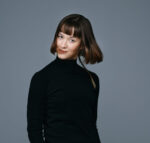CONVERSATION: Hearing the voice of poetry. An interview with Joanna Mueller

Ewelina Adamik: It has been a year since you learned about winning the Silesius Award for lifetime achievements. Please tell us how the awards impacted your artistic work.
Joanna Mueller: I believe that awards influence the recognition of poets, but mainly in the literary field. Most likely, I would not have been invited to so many festivals and literary events if I had not received the Silesius.
Ewelina Adamik: You are the youngest winner in this category and the fourth poet ever. (the Wrocław Silesius Poetry Award has been awarded since 2008 and 12 poets have received the award for lifetime achievements to date – ed. note).
Joanna Mueller: I believe the Lifetime Achievement Award should be given to artists only at the end of their lives. I see this award as a scholarship – I deal with poetry professionally, which is not very profitable. So the financial security of the Silesius has allowed me to catch my breath. I should also add that the award was not awarded solely for my writing. My contribution to the animation of literary circles, for example, in cooperation with Biuro Literackie, was also significant. I see this award as a reward for the reading communities that have shaped and inspired me, such as Wspólny Pokój [Shared Room – ed. note].
Miranda Zarzycka: I do not know how much you can tell us about the work behind the scenes with Biuro Literackie, but we would like to know your impressions of young poetic voices.
Joanna Mueller: Biuro Literackie works with authors at different stages of their careers, not necessarily beginners. This year’s festival programme (TransPort Literacki – ed. note) apparently includes thirty-one writing workshops, each for eight to twenty people, so you can imagine the scale of the undertaking. It is often the case that someone first participates in a festival and then, a couple of years later, runs a workshop or group workshop on learning to write. Finding interesting debutants, the so-called ‘catch’ seems particularly important.
The language of young poetry is changing. For me, it is essential to have originality of style, poetic diction. […] So, one’s voice is vital. I need to see something personal in the poems, and unfortunately, I read a lot of works that are like chameleons – that is, they adapt to what is currently ‘en vogue’ in poetry.
Miranda Zarzycka: Could you tell what criteria you find significant when working with young poetry?
Joanna Mueller: The criteria are shifting because the language of young poetry is changing. For me it is essential to have originality of style, poetic diction, something new and a good ear for what is happening in language today. I also think about the influence of the media on discourse and the socio-political situation. You can write about trending topics, but it has to be done in the right artistic form. So, one’s voice is vital. I need to see something personal in the poems, and unfortunately, I read a lot of work that is like a chameleon, that is, it adapts to what is currently ‘en vogue’ in poetry. To sum up, the mentioned workshops, which complement the festival, have a great influence on whether books by certain authors are published – whereby I mean that the workshop participants’ voices also influence the publishers’ decision.
Ewelina Adamik: Biuro Literackie has been activating the literary circle for years, but it is an inward movement. Do you think that the activities of Biuro Literackie involve readers in what they do?
Joanna Mueller: Artur Burszta has always been interested in including new people in the reception of poetry. He has implemented various ideas, for example, combining comic book form with poetry. He also organised a competition with experienced filmmakers to create short films for poems. I think the musicalisation of words is also attractive – poets and novelists reading on stage to improvised music. If someone listens to a musician or a band and this band/musician suddenly appears among poets and creates something with them, the audience automatically expands.
Miranda Zarzycka: Let us now talk about “Wspólny Pokój”. Who is this programme aimed at?
Joanna Mueller: The Wspólny Pokój Association was founded in 2011. From the beginning we were interested in topics related to literature, art and all creative output of women and the queer community. Our events are designed for different participant groups, but we try not to make the entry threshold too high. We also cater for a wide range of ages, from schoolchildren to university students and senior citizens. We welcome anyone who wants to talk about literature or women’s work.
Miranda Zarzycka: You mentioned the low entry threshold. How do we make niche communities open and welcoming?
Joanna Mueller: Along with more specialised seminars, we also have workshops where we read poetry and make collages and zines. You know, we are located in one of the Finnish houses in the Open Jazdów district, so it often happens that people become interested in what we do by chance, for example, when they are walking around this beautiful estate and see us in the garden working on a zine with poems. The Wspólny Pokój programme grew out of the community that formed in the Old Town Cultural Centre, where, before the Wspólny Pokój seminars began, Poets’ Nights were held under the direction of Beata Gula and Tomasz Świtalski. We continue these activities, for example by organising events that bring together artistic, ecological and activist communities. I think we are bursting the bubble.
My dream would be to start contact with poetry in high school with good hip-hop or rock lyrics to show how a text works through the example of forms closer to teenagers.
Ewelina Adamik: Could it be that we are not sufficiently prepared to read poetry from an early age? Maybe we should not ‘lower’ the threshold, but educate people more effectively… What do you think could be changed to engineer poetry readers?
Joanna Mueller: My dream would be to introduce poetry in high school with good hip-hop or rock lyrics, to show how a text works through the example of forms closer to teenagers. Above all, school lacks classes in poetics so that the kids can understand the structure of a text and see it as a framework made up of concretely ordered syllables, accents and stanzas. This would prevent us from thinking of poetry as the language of angels. It is helpful to compare different texts within the same genre, for example, fantasy, and show what works and what does not work in them. We should think of text as a structure that needs to work. We should think about the tools.
Ewelina Adamik: Indeed, and besides, our canon was never designed for girls and women. Which texts should be included in the core curriculum so that female readers can better relate to the text?
Joanna Mueller: One of the few women in the curriculum is Wisława Szymborska, right? I would suggest including the work of Anna Świrszczyńska, but not just in the context of Budowałam barykadę [Building the Barricade], although that is also an important book. I am thinking more of the female experience and the volume Jestem baba [I’m the Old Woman]. I would also include the poetry of Krystyna Miłobędzka, although some avant-garde impediments in her minimal forms may be difficult for secondary school students. Contemporary female poets should also be included in textbooks. I think anthologies of women’s poetry are worth recommending.
Miranda Zarzycka: How could we reach out to young women to encourage them to read more poetry?
Joanna Mueller: Seeing the immense interest in young adult literature, I thought it would be good to publish poetry collections that deal with themes close to the experience of adolescent girls. We should publish books of poetry written by girls. For example, Aleksandra Byrska wrote a great book in this vein – the volume is yet to be published. Another poet, Adrianna Olejarka, has excellent insights into the sensibility of young girls because, like Aleksandra, she works at a school (and is also waiting for her book debut). I observe the young people who come to events organised by Biuro Literackie and it is interesting to note that young men, at the high school level, for example, are often well-read in new poetry, are familiar with its fashionable trends, have their poetic gurus and try to emulate them. On the other hand, girls are often not familiar with the current textual base (or at least do not refer to it), as if they did not have ‘their poets’. They invoke the poetry of Maria Pawlikowska-Jasnorzewska or Halina Poświatowska and rarely go beyond this classic canon.
Miranda Zarzycka: I was thinking of the phenomenon of Rupi Kaur and her Milk and Honey, a book that has reached a wide audience. I wonder if you have any idea how this happened.
Joanna Mueller: Probably through Instagram, right? I do not want to demonise the messages spread through Instagram and blogs, but I want to see content that is not necessarily Milk and Honey-style poetry. I feel that Anouk Herman has recently broken through to young people, mainly through social media, so there is probably also space on Instagram for Polish writers who create exciting literature.
Ewelina Adamik: Of course, the phenomenon of Rupi Kaur and the so-called ‘Instagram poetry’ shows that people want to read poetry that may sometimes be of questionable quality, but it corresponds to the emotions of young readers. This example shows that the need to read poetry exists and is quite extensive.
Joanna Mueller: Aleksandra Lewandowska has written a great book about girls on the block, about teenagers. I think that this work should be brought into more expansive reading areas immediately. Maria Halber also started with poetry and has now published a prose book about growing up, and I think she has managed to burst her bubble. Girls will eventually find their language and see that it works. On the other hand, I also run poetry workshops for older people. Women who are already retired come and learn about the power of their voice. We once had a gentleman who tried very hard to shine with his dad jokes, but my group of senior women rebuffed him so feministically that he never came back.
Ewelina Adamik: I understand that the participants had the tools to do this because of your workshops.
Joanna Mueller: Indeed. When we started this series of workshops, the participants thought that it was mainly men who wrote and that universal literature dealt primarily with men’s issues. We began our adventure by reading two anthologies, Solistki [The Soloists] and Warkocze [Braids]. Then I brought Swirszczyńska’s poetry to our meetings and it turned out that few of the women had ever heard of her. They were surprised that it was possible to write about, for example, childbirth in a feminist way. Now, years later, the women in the workshop group know this, and in their texts, they are touching on the female experience in their writing and writing very differently. I am not surprised that they made fun of the gentleman who started reading rhymes about women’s handbags and women’s foolishness.
Miranda Zarzycka: You also touch upon feminist issues in your work; you open up this particular area of emancipation
Joanna Mueller: My engaged poetry began with intima thule, that is, in 2015, and indeed this engagement was evident in Waruj, Hista & her sista trule. On the other hand, the theme of motherhood, present in the earlier books, came from a sense that, as a mother and a woman capable of giving birth, I do not find my experiences in poetry, or at least it rarely happens. Nowadays, more and more female poets, even Kamila Janiak, whom no one would suspect, are beginning to take up these themes.
In 2009 we published Solistki, an anthology of women’s poetry, at the Old Town Culture Centre in Warsaw. Next, we published Warkocze, which was a breakthrough. During Silesius’s (2016 edition), there were about 12 women for every 100 men. During the festival, there was a meeting where the male poets wore dresses – a gesture to highlight the lack of female presence in events and debates. Waruj came out of my anger at the situation. I also went to this ‘Silesius without women’ right after a tremendous feminist lecture by Hélène Cixous, who inspired me. After Waruj was published, many women came up to me and said I had written about their own rebellion, and Joanna Łańcucka, who was responsible for the book’s graphic design, illustrated it.
Ewelina Adamik: Last year, when announcing the nominations, Waldemar Mazur officially mentioned quotas in the nominations. He pointed out that the Lifetime Achievement Award was still going to more men. We need to speak out about this issue.
Joanna Mueller: Right, whereas at the very beginning, when you started thinking about women’s representation, strange things happened. We were invited, but in such a way that there were still four men in the conversation and one woman. It was a difficult situation for the one woman to speak out. However, if there were, say, three men and two women, the women would give each other the right to speak; they would amplify each other’s voices. Most of us had already learned to be confident in our voices, but it took a long time.
Miranda Zarzycka: You only mention the last dozen years or so, and we are glad that a lot has changed in that time. To continue with the feminist themes, I wanted to refer to your work dedicated to children, which also features these themes. How do you perceive this engaged oeuvre that will reach children and their parents?
Joanna Mueller: I design my poems so that the meanings that children cannot fully see are comprehensible to adults. For example, I wrote a poem about a seahorse. This species has males, not females, carry offspring in a nesting pouch and then ‘give birth’ to them. For children, it is mainly a poem about nature, engaging in form because the shape of the written text resembles a seahorse, while when I read the poem in schools, older readers, such as teachers, giggle and tell me that it is a feminist text about dads who do not want to take part in raising children.
Ewelina Adamik: I wanted to elaborate on the entry threshold we discussed earlier in relation to what you said about the meanings adults see and children do not. Poetry is not profitable and it does not sell so authors can afford to pursue their visions knowing that their book will end up in the hands of people who are already familiar with such texts – thus not reaching a wide readership. But can we somehow open up poetry without compromising our creative ambitions?
Joanna Mueller: It seems to me that there are different kinds of circulation. Małgorzata Lebda’s poetry has recently found a wide readership, although previously these poems were known only to a niche audience. Małgorzata has also become known for her activism (the poet ran 1,113 km along the Vistula in protest against the construction of the environmentally damaging E40 road – ed. note). Moreover, Małgorzata’s poems are more accessible than those of other poets, and they also deal with essential issues. We are now reading her novel, Łakome, which, unlike poetry, reaches its audience more quickly because it is prose.
Ewelina Adamik: Perhaps it is worth recommending poetry that interests the readers thematically but are not very uncomfortable in terms of form or concept. Next, we could recommend further volumes, which are still potentially interesting but more demanding.
Joanna Mueller: Absolutely! In the context of ecological themes, it would be worth starting with the poetry of Urszula Zajączkowska or Małgorzata Lebda, who write in a relatively accessible poetic language, and then suggesting poems by Julia Fiedorczuk or Klaudia Pieszczoch, which are somewhat more challenging to read. For example, if someone likes the poetry of Anouk Herman, they should try reading more complex poetic concepts, such as the volumes by Łukasz Kazmierczak/Łucja Kuttig.
If someone becomes an ambassador for poetry, let them talk about other works, about specific poems. They will reach people who may be interested in contemporary poetry and who have heard nothing about it so far.
Miranda Zarzycka: To bring our conversation to a slow end, I would like to return to the topic of awards – does winning a poetry prize have a tangible effect on book sales?
Joanna Mueller: Only the Nike award has that kind of power. It was recently given to Jerzy Jarniewicz (for Mondo cane in 2022 – ed. note). Please note that thanks to this award, more people have become interested not only in Jerzy’s poetry, but also in the translations that Jerzy does. It would be good if poets who get recognised, for example by the Nike jury, involved other poets and poetesses in their work. If someone becomes an ambassador for poetry, let them talk about other works, about specific poems. They will reach people who may be interested in contemporary poetry and who have never heard of those works.






